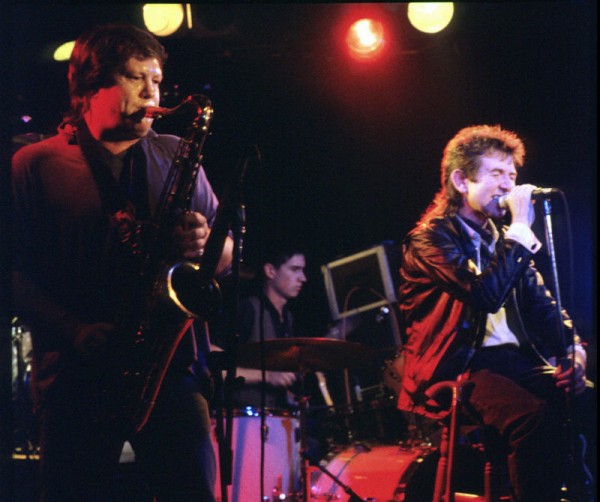Rolling Stones sax player Bobby Keys dead

In this May 12, 1987 file photo, Ronnie Lane, right, along with Bobby Keys on saxophone, join The Tremors at the Steamboat, in Austin, Texas. Keys, who performed on recordings with John Lennon and Eric Clapton, has died at his home in Franklin, Tennessee. He was 70 years old. AP/Austin American-Statesman, Casey Monahan
NASHVILLE, Tenn. — Saxophonist Bobby Keys, a lifelong rock ‘n’ roller who toured with Buddy Holly, played on recordings by John Lennon and laid down one of the all-time blowout solos on the Rolling Stones’ “Brown Sugar,” has died. He was 70.
Michael Webb, who played keyboard with Keys, said Keys died Tuesday at his home in Franklin, Tennessee, after a lengthy illness. Keys had been on tour with the Stones earlier this year before his health prevented him from performing.
“The Rolling Stones are devastated by the loss of their very dear friend and legendary saxophone player, Bobby Keys,” the band said in a statement. “Bobby made a unique musical contribution to the band since the 1960s. He will be greatly missed.”
Keys, one of the few rock saxophonists to become a name in his own right, was a heavy-set man with jowls to match and had a raw, piercing sound. The Lubbock, Texas, native was born the same day as Keith Richards — Dec. 18, 1943 — and the Stones guitarist would often cite Keys as a soul mate and favorite musician. On “Brown Sugar,” he needed little time to seal his history with the band, which had decided a saxophone would work better than a guitar for the solo spotlight.
“It was the first take,” he would recall.
Keys also played memorable solos on such Stones favorites as the seven-minute jam “Can’t You Hear Me Knocking” and the country-styled “Sweet Virginia.” Other career highlights included Lennon’s chart-topping “Whatever Gets You Through the Night” and albums by Richards, George Harrison, Barbra Streisand and Eric Clapton. A self-titled solo album featured Harrison and Ringo Starr.
For a time, Keys played clubs and was billed as “Mr. Brown Sugar.”
“I have lost the largest pal in the world, and I can’t express the sense of sadness I feel, although Bobby would tell me to cheer up,” Richards said in a statement.
Keys’ career dated to the 1950s, when as a teenager he played with fellow Lubbock native Holly and The Crickets. He met the Stones in the mid-’60s while they were on the same bill at a state fair in San Antonio, Texas, and was distraught that the British rockers had recorded a cover of Holly’s “Not Fade Away.”
“I said, ‘Hey, that was Buddy’s song,'” Keys recalled in Richards’ memoir “Life,” published in 2010. “Who are these pasty-faced, funny-talking, skinny-legged guys to come over here and cash in on Buddy’s song?”
But once Keys listened more closely, he decided the Stones were playing “actual rock and roll,” an opinion the Stones more than shared about Keys. He first recorded with them in the late 1960s and toured and recorded with them off and on over the following decades, his work featured on three of the group’s most acclaimed albums: “Let It Bleed,” ”Sticky Fingers” and “Exile on Main Street.”
In some ways, he was too close to Richards, sharing a taste for throwing televisions off hotel balconies and developing a heroin addiction that led to his temporary estrangement from the group. But he was with the Stones on every major tour over the past quarter century, dependably stepping up for his solo on “Brown Sugar.”
Keys’ memoir “Every Night’s a Saturday Night” was published in 2012, with a foreword by Richards. Keys recalled that he was exposed to rock ‘n’ roll through Holly’s music — not on the radio, but at the grand opening of a Texas gas station near the home of Keys’ grandparents. It was the first time he heard an electric guitar played live.
“And right then and there I knew I wanted to have something to do with that music,” Keys explained. Holly “just kinda lit a fuse that started burning then, and it’s still burning now.”
RELATED STORIES
Soul of Rolling Stones, Keith Richards, to turn 70
The Rolling Stones marks 50 years with 3-CD-50-track greatest hits collection